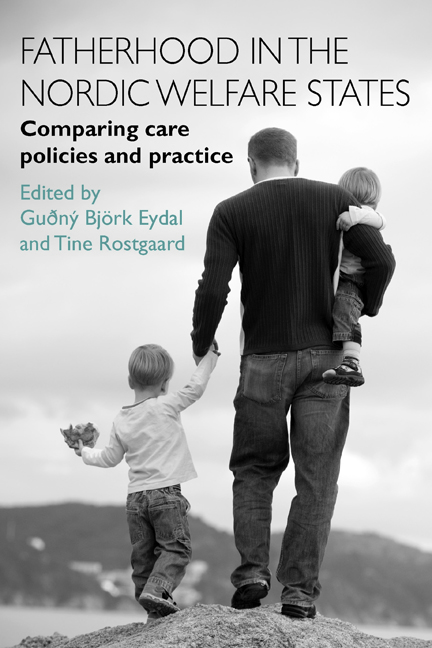Book contents
- Frontmatter
- Contents
- List of tables and figures
- Notes on contributors
- Acknowledgements
- one Introduction
- Theme 1 Fathers, families and family policies
- Theme 2 Fathers in everyday life – culture, work and care
- Theme 3 Constructing fatherhood in different family settings
- Theme 4 Caring fathers and paid parental leave policies
- Theme 5 International reflections on findings
- Conclusions
- Index
Conclusions: ‘What is constructed can be transformed’
Published online by Cambridge University Press: 04 March 2022
- Frontmatter
- Contents
- List of tables and figures
- Notes on contributors
- Acknowledgements
- one Introduction
- Theme 1 Fathers, families and family policies
- Theme 2 Fathers in everyday life – culture, work and care
- Theme 3 Constructing fatherhood in different family settings
- Theme 4 Caring fathers and paid parental leave policies
- Theme 5 International reflections on findings
- Conclusions
- Index
Summary
The aim of this book has been to provide an insight into the contemporary policies and practice of fatherhood in the five Nordic countries of Denmark, Finland, Iceland, Norway and Sweden. Authors from all five Nordic countries have written about fatherhood, how fathers in the Nordic countries practise fatherhood and, how such practices are framed by policies.
The book and its themes have been framed by the particular geographic setting in which it takes place. As the Nordic countries are known for their welfare model and extensive support to families, this book has investigated those policies that set out to support fathers in caring for their children, and asks if the outcomes of such policies are consistent with the goals outlined in Nordic family and gender equality policies. In addition to family law and policies on family benefits, the book has investigated fathers’ right to individual entitlements of paid parental leave, otherwise known as the ‘father's quota’. Furthermore, the book has investigated how Nordic fathers practise fatherhood in diverse family settings. Thus, the book offers an understanding of the complexity in constructing fatherhood: how it is shaped in the interaction between policies, cultures and the daily practices of fathers, highlighting both similarities and differences within the Nordic region, and addressing the diversity among the Nordic populations, including ethnicity, class, sexual orientation and parental status.
The book has addressed new fathering practices. As other studies have shown, the international trend indicates that fatherhood is gaining a higher status, and fathers are becoming more preoccupied with finding time to spend with their children (O’Brien and Shemilt, 2003; Gauthier and DeGusti, 2012). Nevertheless, in Chapter Two, Rostgaard and Moberg find that Nordic fathers have more relaxed attitudes towards the importance of fatherhood in comparison with other European fathers. This includes the value they place on fatherhood as a condition for adulthood, and whether they accept voluntary childlessness as well as which age is the right age to have children. The results indicate that Nordic fathers show a tolerance towards the variety of choices other men can make in adulthood.
- Type
- Chapter
- Information
- Fatherhood in the Nordic Welfare StatesComparing Care Policies and Practice, pp. 393 - 400Publisher: Bristol University PressPrint publication year: 2014

